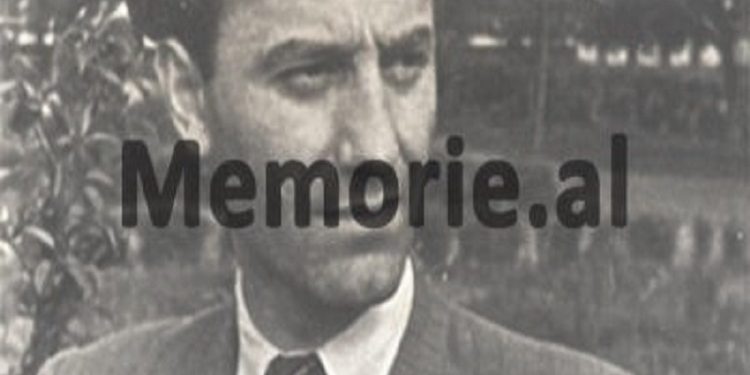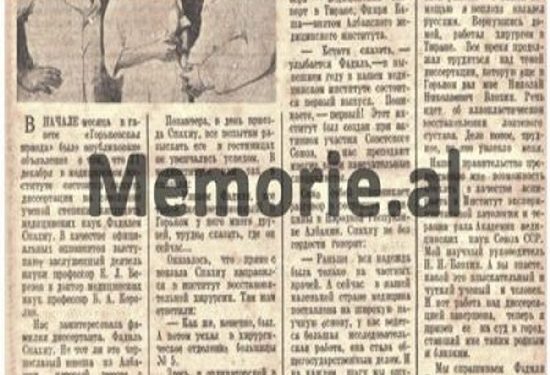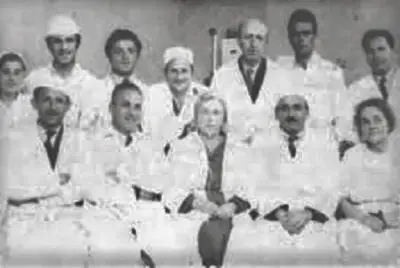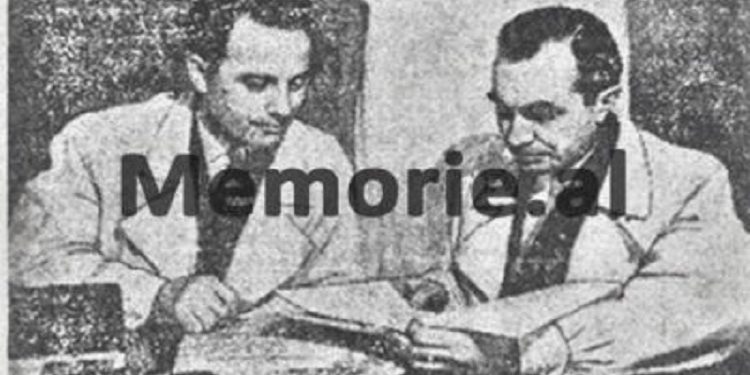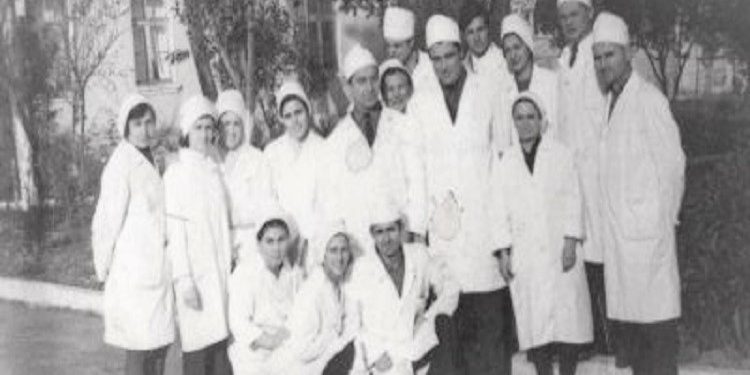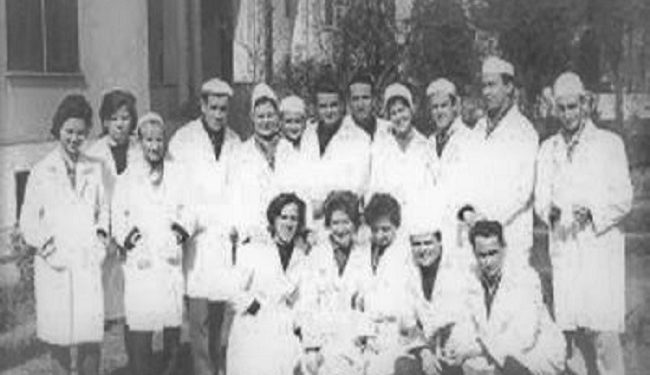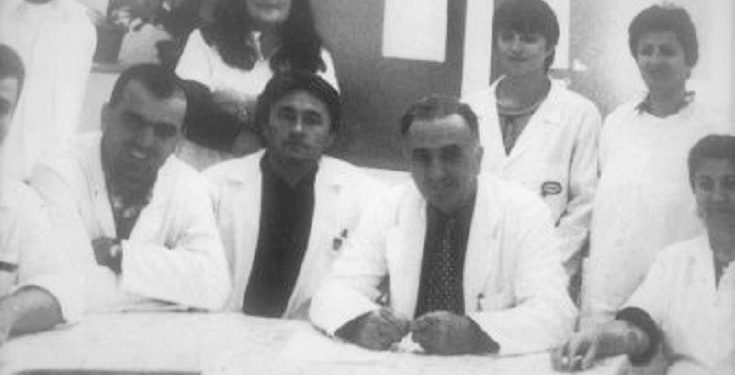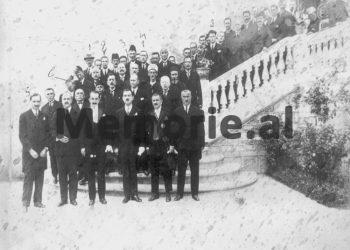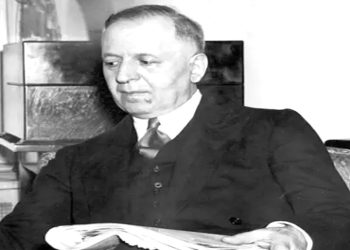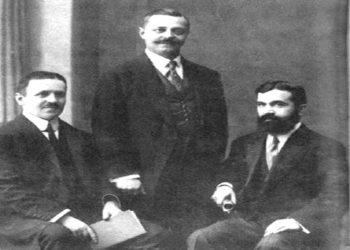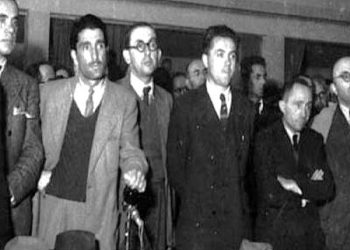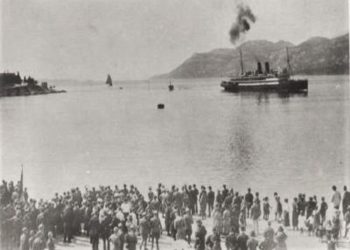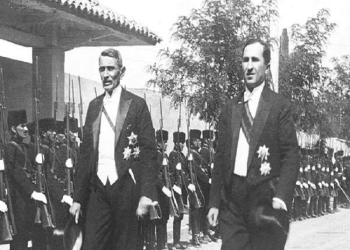Dashnor Kaloçi
Memorie.al publishes the unknown story of Fadil Spahiu, originally from the village of Kolesjan in the district of Kukës, who during the war period when he was a student in the gymnasium of Shkodra and a dormitory in “Our Mountains” together with Emin Duraku, connected with youth groups of that city where he was arrested and imprisoned after participating in the demonstration of November 28, 1939. Fadil’s long odyssey in some high schools in the country, such as Shkodra, Tirana and Gjirokastra, where he was expelled from school several times and was arrested for his participation in the Anti-Fascist National Liberation Movement, until the end of 1944, he enlisted as a partisan in the Luma Battalion (where his father, Rifat Spahiu, was Chairman of the National Liberation Council of Kukes Region), also took part in the fight for the liberation of Tirana in November ’44. Fadil’s participation in the construction of the Brcko-Banovic railway in Bosnia in September 1946, where he began his higher studies at the Faculty of Medicine in Sarajevo, from where he would leave in 1949, to the Soviet Union, where he would graduate with honors from Moscow Medical University, earning the degree of “Candidate of Medical Sciences”. Fadil’s return to Albania and his work full of passion and dedication in the Civil Hospital of Tirana, where he made a great name as a doctor and lecturer at the Faculty of Medicine, from where he would be removed as “enemy of the people”, initially in Gramsh and more than in Tepelena, where he was arrested, causing him to suffer for 18 years in the prisons of the communist regime of Enver Hoxha.
Fadil Spahiu is one of the dozens of Albanians who during the communist regime of Enver Hoxha had the opportunity to study in universities of Eastern European countries, where thanks to his skills he graduated with excellent results and wrote the largest newspapers of the Union. Soviet of that time. After graduation, he returned to his homeland and continued his passionate work, dreaming of becoming a skilled doctor and serving his compatriots to the best of his ability. And he initially achieved this, becoming one of the most famous doctors in Albania, but his dream suddenly shattered in the middle and “one fine day” he found himself in handcuffs in the prisons of the communist regime of Enver Hoxha, accused of being an “agent of the Soviets”, etc., allegations mounted by the State Security. Regarding this and in general about the life of Fadil Spahiu, we will be known in this article from the data we were able to collect from his relatives, as Fadil himself, now at the age of 95, did not want and has never admitted that to talk about him, even though he was one of the most famous doctors in Albania.
Who is Fadil Spahiu?
Fadil Spahiu was born in Kolesjan in the district of Kukës in 1926, in a patriotic river family. His father, Rifat, was a well-known man throughout the province of Luma and beyond, a worthy successor to the patriotic and education-loving traditions of his tribe. He had graduated from the Normal School of Elbasan and for years he worked as a teacher in the cities and villages of Albania. Rifati was the chairman of the Kukës Regional Council, immediately after the War (November 1944) when Prizren was included under his jurisdiction.
High school student in Shkodra, friend with Emin Duraku in the dormitory “Our Mountains”
Fadili completed primary school in his hometown and in 1937, he began his studies at the high school in Shkodra. Here he soon became active with the city’s youth groups and took part in the first demonstration against the fascist occupation on November 28, 1939 where he met one of its organizers, Emin Duraku. There he was noticed by the occupying Italian authorities for his courage and determination to carry out anti-fascist activities. Government forces managed to disperse the demonstrators and Fadil Spahiu along with several other comrades, including students of the “Our Mountains” dormitory, who were arrested by them. Even when he was in his second year, about 14-15 years old, he was expelled from school and beaten in the dungeons of Shkodra prison. From here, with about 16 other detainees, they sent him to Tirana prison and after a few days, they sent him to Burrel prison. Fadil’s father, who in that year was a teacher in the village of Kastriot in Peshkopi, made a request to the relevant authorities asking to bring his son to the dormitory of the village school, which was approved and Fadil was brought to of the father, with the obligation to report daily to the village police post.
He is expelled from all high schools as an anti-fascist and is a partisan
In the spring of 1940, a revolt broke out inside the Shkodra gymnasium inside the school where students demanded the return of 16 of their friends who had been arrested during the demonstration. Meanwhile, after 3-4 months had passed, Fadil was returned to the school benches where he finished his second year. To avoid his contacts with revolutionary elements of the city, he was sent to Gjirokastra, to continue for the third year. Here he soon became involved as a member of the anti-fascist organization of Gjirokastra youth and was put in charge of anti-fascist protests that took place in Gjirokastra, on November 28, 1941. For this reason, at the end of 1941, Fadil was expelled from all schools in Albania, still without finishing the third year of high school. Based on this, he was forced to leave Gjirokastra to avoid a second arrest and immediately left for his hometown. With the intervention of his parents, he went to Pristina to some of his father’s friends to continue his high school there, but even there he resumed his revolutionary activity, printing and distributing tracts of the Pristina Communist Party organization. His activity caught the eye of the relevant state bodies and he is forced to return to his homeland, where the Luma squad had just been formed, and there he registered as its partisan. Fadil then passed as an effective of the Luma Battalion and fought in this partisan formation until the liberation of the capital, Tirana, on November 17, 1944.
Immediately after the liberation of Tirana, he returned to his hometown where he was elected a member of the Regional Committee of the Anti-Fascist Youth of Kukes. In the summer of 1945, he came back to Tirana to attend the summer course that was organized at the “Queen Mother” school with students who had lost their high school years due to the War. Here he completed his third year and his fourth year in the city of Gjirokastra, graduating in May 1946. After volunteering for the construction of the Brcko-Banovic railway in Bosnia in September 1946, he began his studies. higher at the Faculty of Medicine in Sarajevo, in the branch of General Medicine.
Medical student in Yugoslavia and the Soviet Union
In 1948-49, after official Tirana broke off friendly relations with Tito’s Yugoslavia, before the second year was over, Fadil, along with other Albanian students who were in Yugoslavia, were returned to Albania. Initially, they gathered on the beach of Durrës, accommodating them in several hotels waiting to start their studies again, but this time sending them to the Soviet Union at the “Maxim Gorky” University. His former colleagues and friends point out that Fadil was a student who stood out for his character; he was exceedingly diligent and active in lessons. Fadil as a student was the best and seeing his skills and perseverance to learn everything, the pedagogical doctors immediately activated him in operations at the Institute of Restorative Surgery, which dealt mainly with war invalids and their traumas. The pedagogues, who were the clinical chiefs, constantly took Fadil to their own clinic, entrusting him with specialty surgeries, such as orthopedics, kidney, stomach and lung surgeries, etc.
In 1953, while regularly attending studies, his professor, Bllohin, who was the General Director of the Institute, entrusted him and proposed the scientific topic “On the replacement of joints with metal-plastic prostheses” and Fadil studied a lot on that topic while take with him out of lesson schedule. In 1954, when he graduated as a doctor, Fadil had managed to perform 8 experiments with animals (with dogs), replacing the back ankle with a metaloplastic prosthesis constructed by him and approved by the scientific council of the Institute. After that, that institute approved the possibility of designing and applying that prosthesis to humans. Scientific leader, prof. N. N. Blohin, believed him yesterday, gave him his opinion in writing, that the realization of that prosthesis in man, would serve as a genuine scientific work for obtaining the degree “Candidate of Medical Sciences”.
At the end of his studies with very good results at the University “Maksim Gorkij”, Fadili graduated as a surgeon and in 1953, he returned to Albania. After returning home, he initially worked as a general practitioner in the third ward of the Tirana Civil Hospital, where his work as a surgeon immediately stood out. He performed difficult operations and this made his name known very quickly, not only in Tirana, but also throughout Albania. After a while, he was transferred to the hospital in Durrës, where he performed operations here as well, being a general practitioner.
Russian professors rate him as “Candidate of Medical Sciences”
The recommendation of the Russian professors positively influenced the senior leadership of the P.P.SH. of that time in Albania, causing Fadil to be given the right to pursue postgraduate studies. For this purpose he was sent back to Moscow, already to the Scientific Institute for the Fight against Cancer at the Moscow Academy of Medical Sciences, where at that time his scientific leader N.N. Bllohin. In 1956. Fadil successfully performed for the first time in the world, the replacement of the elbow joint with metal-plastic internal prosthesis in man, which was a rare event for the European medicine of the time. The pedagogical body of the institute accepted and evaluated with maximum marks this new result of the Albanian surgeon, which made him gain the degree of Candidate of Medical Sciences. After that, in addition to orthopedic surgeries at that institution, he also operated on cancer patients. At the end of his three-year studies in Moscow in 1957, Fadil returned to Albania with the title “Candidate of Medical Sciences”, a title which no other Albanian doctor had at that time.
Surgeon at Tirana Hospital
In 1957, Fadil started working as a surgeon at the Tirana Hospital, with several years of faith and experience. He worked with a special desire to create the Department of Orthopedics and thanks to his skills; I immediately created it and was appointed the first head of this clinic. In addition to working in the clinic, he also served as a lecturer at the Faculty of Medicine of the University of Tirana, where he taught Orthopedics and Oncology. After two years, the Oncology Clinic was established and he ran both of these clinics until 1965. These years were the years of the greatest success in his work and in addition, he worked as the editor-in-chief of the Medical Bulletin, which published Faculty of Medicine and member of the University Scientific Council.
At the Orthopedics and Oncology Clinic run by Fadil, the implementation of surgeries at all levels began at that time. But this does not last long! His colleagues began plotting and slandering and reporting to the party organization, which led to him being labeled an “enemy of the party” and prosecuted by the State Security. After that, the meeting of the basic party organization of Hospital Nr. 2 and in 1964, the general assembly decided to expel him from the Party, accusing him of being “infected by the ideology of the enemy”. All this happened after the ground was prepared with pressure, coercion and threats by the State Security, in order to punish and imprison the doctor Fadil Spahiu, in order to open a job at the Tirana Hospital, one of the doctors who was the close man of one of the members of the Political Bureau of the Central Committee of the ALP. After he was expelled from the Party, he was removed from Tirana and appointed as a doctor in the hospital of the city of Elbasan. But even here he did not work for more than two weeks, as State Security officers threw handcuffs at him and he ended up in the cold cells of the communist regime’s political prisons. After two years he was released from prison and due to the lack of medical staff, he was appointed as a doctor in the hospital of the city of Gramsh.
Even after his release from prison, Fadil began to work with the same dedication that characterized him in the small hospital of the town of Gramsh, doing his best to recover him. With his direct work he transformed Gramsh hospital, making it one of the best regional hospitals of the time. Thanks to his dedication and professional merit, his name was mentioned everywhere as one of the best doctors in the country. Based on this fame, they came there for operations from all over Albania, with all kinds of diagnoses and he treated them very carefully. In the Gramsh district, Fadili worked for about 10 years, until 1976. Although the results of his work as a surgeon were extraordinary, suddenly one day a meeting of the Executive Committee of the Gramsh district took place, in which the main “object” was Dr. Fadil.
He is described as “an incorrigible enemy who treats people badly, capable of compromising high-ranking party cadres and power in the districts.” After that, they removed him from Gramsh and sent him to the village of Progonat in Kurvelesh, ostensibly to help the sick and put them in a cow stable to live with. This situation does not last long, because after two weeks he is arrested again by the State Security, while his wife and sons are taken to Memaliaj.
He is accused of being a “Russian agent” and sentenced to 18 years in prison
After his arrest, Fadil was sent to the Gramsh Branch of Internal Affairs, where the investigation process immediately began against him, asking him to admit that “he is an enemy of the party and an agent of the Russians, that he is an enemy of the people, that he does not agree with the line of the Party ”, and other accusations of this nature. The investigation process against him was quite fierce and lasted four months. Fadil was then taken to court where he was sentenced to 18 years in prison, with charges entirely fabricated. After serving his sentence, Fadil was first taken to the Bulqiza prison and then transferred to the Spaç prison, where he served as a doctor, appearing to his accomplices at all times. (At this time, his wife had divorced him). In the fall of 1986 when he was 60, he was released from prison, exhausted, but still had faith that they could help him resume work from scratch as a doctor, as he did not want to accept retirement age. He believed in the few former comrades who had survived the dictatorship. In fact no one could help him. Since then, he lives on a small pension in his apartment somewhere near the Albanian Radio Television, where even though he is now 95 years old and with a life full of sufferings and vicissitudes, he does not give up books and medical literature, to whom he devoted his whole life.
The article of the Russian newspaper “PRAVDA” about the Albanian graduate doctor
“Fadil Spahiu defends his dissertation”
(Last night at the Institute of Medicine)
At the beginning of the month, the newspaper “Pravda” of the city of Gorki published the announcement that on December 21, at the Institute of Medicine, the defense of the dissertation for obtaining the scientific degree of Candidate of Medical Sciences, Fadil Spahiu, would take place. The official opponents of the defense are: Honored Master of Science, Professor E. M. Berezov and Doctor of Medical Sciences Professor B. A. Korolev.
We are interested in the family of the dissertation Fadil Spahiu. Is that the black-eyed boy from Albania who, together with a group of his friends, graduated in 1953 at our Institute of Medicine? We have met him in medical clinics, in the libraries of the Institute as well as in the collectives of amateur artistic groups, where Russian songs were sung together with Albanian songs.
The day before yesterday, the day Fadil came, all attempts to find him in the city hotels were unsuccessful. At the Institute of Medicine we were told:
“We know Fadil, as always tireless. “In Gorky he has a lot of friends and it’s hard to say where he is now.
In fact, from the train station he went to the Institute of Surgery, where they told us: “Yes, Fadil was here. Then he went to the Surgery Clinic of hospital no. 5”.
There we finally found the young Albanian doctor together with a group of close friends of the Institute. He was asked how Bajram Preza works, where Fiqri Basha works.
Fadili says that his teammates now work in Albania: Bajram Preza is a neuropathologist, Bashkim Çuberi is a medical expert in Tirana, Fiqri Basha is an anatomist at the Albanian Institute of Medicine.
Smiling Fadil says: “This year our Institute of Medicine publishes the first issue of the Scientific Journal, do you understand, the first issue. “This institute was established with the help of the Soviet Union and your excellent specialists teach there.”
The conversation automatically turns to the state of medicine in the People’s Republic of Albania. F. Spahiu not without boasting says:
Previously all hopes for medical problems were in the work of particular doctors. Now in our small country medicine has been established on sound scientific basis, in our country medicine has become a general government work. At every step we feel the invaluable help of Soviet friends. For this reason, the Albanian people are very grateful to you.
All participants in the conversation are naturally interested in the changes in the life of Fadil Spahiu himself.
“What can I tell you? You understand how difficult it was for me at first, I did not know a word of Russian and now – with a smile on his brunette face again – with your help I learned Russian very well. When I returned home I worked as a surgeon in Tirana. All the while I kept working on the topic of the dissertation, which N.N. had given me. Blohin since I was a student in Gorky. It is about replacing the elbow joint with plastic material. It was a new, difficult work but I liked it.
Our government gave me the opportunity to come as a researcher at the Institute of Pathology and Experimental Therapy of the Academy of Sciences of the Soviet Union. My scientific leader was N. N. Bllohin. You know this man, a remarkable and very exegetical scientist. My dissertation work has been completed and I have brought it for evaluation to the city that has already become so close and dear to me.
We asked F. Spahiu about his plans for the future.
I have to spend a few months in Moscow and then I will return home. In your decision I went through a great and beautiful school. Will never forget it, ever.
* * *
Last night at the Institute of Medicine was held the defense of Fadil Spahiu’s dissertation. In the hall were professors, lecturers, young doctors and students.
The Secretary of the Scientific Council informs about the dissertation biography: he is 30 years old, is a member of the Albanian Labor Party, former active fighter in partisan units and is decorated with the Medal of Labor. F. Spahiu has completed with excellent results his studies at the Institute of Medicine in Gorky and has completed two scientific papers.
The dissertation speech was followed with great attention.
Corresponding member of the Academy of Medical Sciences of the Soviet Union NN Bllohin, proved his great commitment to the work: We are glad that the skilled surgeon returns to Albania, who can now independently perform difficult operations in any part of the body.
The official opponents, E. L. Berezov and B. A. Korolev, highly praised the work of F. Spahiu, emphasizing its great importance.
The Chairman of the Scientific Council stated that F. Spahiu was unanimously awarded the scientific degree of Candidate of Medical Sciences.
Dozens of people shook hands with the young scientist. But he was moved and enthusiastic to repeat only one word that came from his heart: thank you.
A. Lytvyn
In the photo: In the Surgery Department of the Hospital Nr. 5 Fadil Spahiu (right) meets with his colleagues at the V. N. Chinenkova Institute of Medicine, who is an Assistant to the Department of Hospital Surgery, and M. S. Lebedev, a surgeon.
In the photo on the right Fadil Spahiu with his scientific leader N. N. Bllohin, Doctor of Medical Sciences, Professor. Memorie.al
Photos by P. Mazzhuhin




